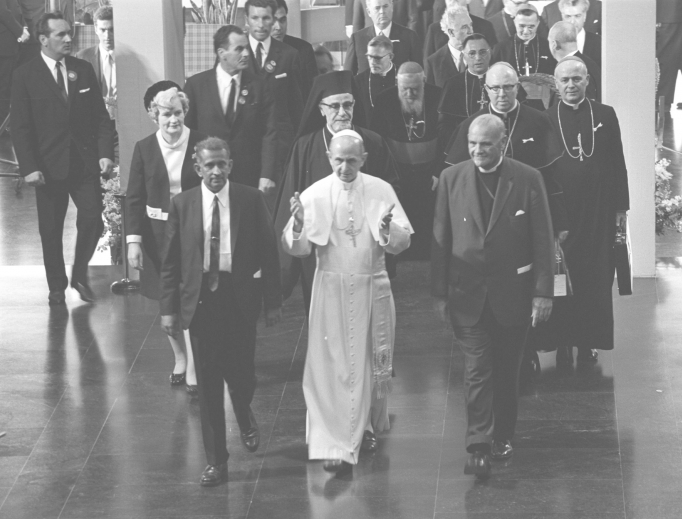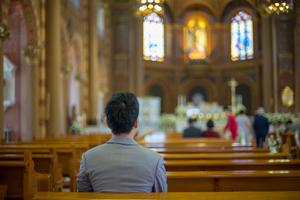The Popes, Geneva and the World Council of Churches
COMMENTARY: Pope Francis’ visit to Switzerland builds on the legacy of his predecessors.

Pope Francis will make a one-day trip to Geneva, Switzerland, June 21, the 23rd foreign journey of his pontificate. He will meet with the Swiss Catholic community that comprises nearly 40% of the population, but his primary concern will be to mark the 70th anniversary of the World Council of Churches (WCC) with a visit to its Geneva headquarters.
Francis will be the third pope — after Blessed Paul VI and St. John Paul II — to go to Geneva and the WCC.
Pope Paul VI went to Geneva in June 1969 to celebrate the 50th anniversary of the International Labor Organization, but he also made a significant stop at the WCC headquarters. In June 1982, Pope St. John Paul visited the offices of the International Committee of the Red Cross and met with representatives of the Conference of International Catholic Organizations. He was back exactly two years later as part of a wider trip to Switzerland and visited the WCC then.
The World Council of Churches was established Aug. 23, 1948, in Amsterdam, Netherlands, but soon moved to its current home in Geneva. A fellowship of churches that acknowledge “Jesus Christ as Lord and Savior,” it has a current membership of 348 Christian denominations, with more than 500 million communicants in 110 countries, including the Anglicans, Baptists, Lutherans, Methodists and Reformed.
Most of the Orthodox Churches are also members. While relations have been generally solid between the Holy See and the WCC, the popes have never approved actual membership. The Church remains an observer, and the Vatican also sends representatives to WCC meetings and participates in such major events as the annual Week of Prayer for Christian Unity every January.
‘Il nostro nome è Pietro’
Pope Paul VI’s arrival at Geneva came while the relationship between the Church and the WCC was still new. During the Second Vatican Council, two observers from Geneva were present at all four sessions, and Paul noted that only four years before, in 1965, Cardinal Augustin Bea, the president of the Secretariat for Promoting Christian Unity from 1960 until his death in 1968, had been welcomed at the headquarters.
Now, for the first time that a pope was standing before them, Paul declared, “Il nostro nome è Pietro” (“Our name is Peter”). The Vicar of Christ reminded the members of the WCC of the responsibilities of Peter the Apostle and his successors. But Paul also stressed the other titles of Peter — “Fisher of Men” and “Shepherd” — and that there is “a constant tension of humility and of sorrow for the divisions that exist among the disciples of Christ” and a “desire and hope for the re-establishment of unity among all Christians.”
Why then, Paul asked, should the Church not become a member of the WCC? He answered plainly that the time was not yet ripe. The question, he said, “involves serious theological and pastoral implications” and consequently requires “in-depth studies and … a journey that … could be long and difficult.”
The Pope, however, encouraged the search for the unity so clearly desired by Christ. After the meeting, he said Mass as pope at the Parc de la Grange in Geneva, where he proclaimed that “the holy mysteries, which work among us — the real and sacramental presence of the Body and Blood of Christ — perpetuate the sacrifice of his redemptive passion.”

‘A Sign of Desired Unity’
Fifteen years later, in the middle of his six-day trip to Switzerland June 12, 1984, St. John Paul II followed Paul and visited the WCC headquarters. He did so after Mass that same day at Lugano, and, like Paul, he began by reiterating his commitment to ecumenism as Peter.
“The simple fact of my presence among you,” he pledged, “as a bishop of Rome, on a fraternal visit to the World Council of Churches, is a sign of this desire for unity.” He added, though, “Of course, when the Catholic Church enters the severe and troubled ecumenical enterprise, it carries with it a conviction. Despite the moral miseries that throughout history have marked the lives of its members and even that of its leaders, it is convinced that it has preserved in the ministry of the Bishop of Rome, in full fidelity to the apostolic Tradition and the faith of the Fathers, the visible sign and guarantor of unity.”
He went on to offer areas of common ground between the Church and the WCC, invoked the memory of Paul VI, expressed thanks for the progress that had been made and exclaimed that there was no going back.
Like Pope Paul VI, though, he sounded a positive note.
“I cannot but remind you of the firm determination of the Catholic Church to make every effort to shine the light of re-established koinonia [communion] one day. And how could we ever do it, without striving to continue to grow in mutual respect, in mutual trust and in the common search for the one truth?”
An Ecumenical Pilgrimage
Pope Francis is aware of the words of his predecessors and has embraced their commitment to ecumenism. He has forged an excellent relationship with the Ecumenical Patriarch Bartholomew of Constantinople, had an historic meeting with Russian Orthodox Patriarch Kirill of Moscow in Havana, Cuba, in early 2016 and traveled to Lund, Sweden, in 2016, to begin the commemoration of the 500th anniversary of the Protestant Reformation.
A papal visit to celebrate the WCC’s milestone is thus not unexpected, even as the road to unity remains fraught, as so many Christian denominations have moved farther and farther away from the Church on matters of both faith and morals. This adds to the challenge that Pope Francis — and his successors — will face.
It is telling that Francis’ journey to Geneva — described by the Vatican as an “ecumenical pilgrimage” — is almost exclusively dedicated to the WCC. Pope Francis will deliver two major addresses during the brief sojourn. Is it possible he will announce that the time is finally ripe for the Church to join the WCC?
With Francis it is always difficult to predict, but it would be an immensely controversial decision among Catholics who fear watering down the faith in the pursuit of a false unity. He knows the cautionary words of his predecessors, including St. John Paul, who also said in that 1984 Geneva trip, “The way is long, and it is necessary to respect its stages.” And he would do well especially to remember Pope Paul VI’s memorable greeting, “Our name is Peter.”
Matthew Bunson is a Register senior editor.
















